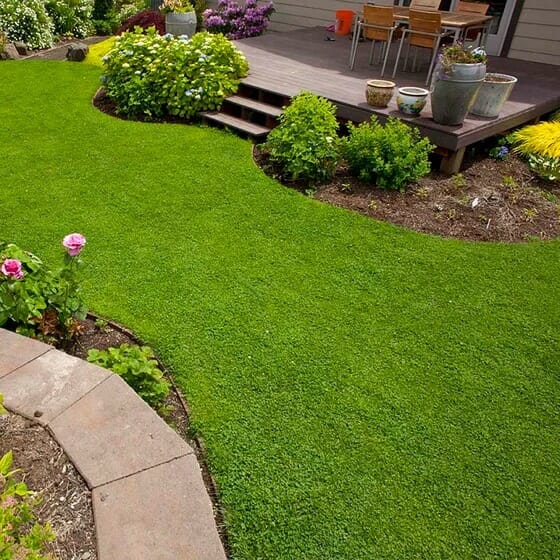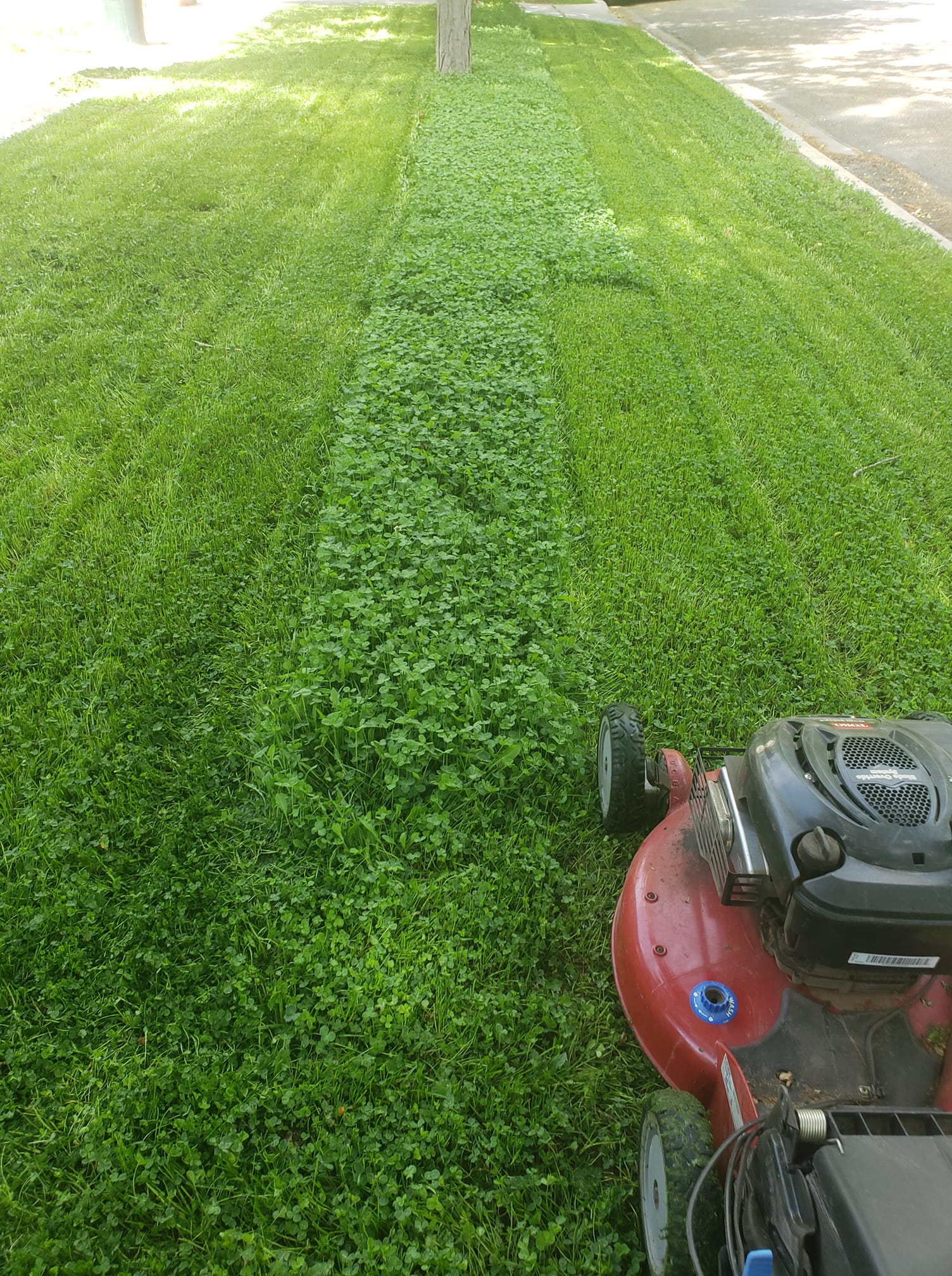While many people consider clover a weed today, this has not always been the case.
In the 50s, it was regarded as the standard for lawn care excellence, but the plant died when people began killing weeds with herbicides.
Nonetheless, you can move away from the norm (planting grass on your lawn) and consider introducing micro-clover as grass lawn alternatives.
You can choose to develop a lawn entirely or primarily made of clover. Alternatively, opt for a mixed lawn-grass lawn.
If you are considering a mini clover lawn, you must know its pros and cons.
So, without much ado, let’s explore them and everything else you need to know.
What is Microclover?
Micro clover is a smaller, low-growing variety of the Dutch white clover or white clover. It has fewer flowers, smaller leaves, and its clump-forming habit is less aggressive than the white clover.
Its popularity stems from its ability to combine with turfgrass yards, forming a uniform look without crowding your grass.
Read More:
- Best Edible Ground Cover Plants For Your Yard
- Dichondra lawn pros and cons
- Creeping Thyme Lawn Pros and Cons
For decades, micro clover has been popularly used in lawns in Europe and is now becoming common in the United States, with popular varieties being “Pipolina” and “Pirouette.”
Microclovers can make your yard attractive and tidy.
Micro-clover Lawn Pros
Let’s look at the benefits and downsides of growing micro clover on your lawn to weigh whether it is the best yard cover for your home.
Below are some of the advantages of having a mini clover lawn.
1. Natural fertilizer
Micro clovers are nitrogen-fixing legumes meaning they make their own fertilizer, so you do not need to fertilize a lawn with micro clover growing.
In addition, the grass (if any) in your yard gets fertilized, helping it grow greener and healthier.
2. Needs no or little mowing
Unlike traditional grass that must be mowed regularly to stay healthy and tidy, you can let your micro clover lawn grow long to create a meadow-like, beautiful space.
Also, it does not grow high, and its growth rate is slower than grass.
Also Read: How to get rid of clover in lawn naturally
While you do not have to mow it, you can trim your micro clover in mid-summer to deadhead the old blooms, make your lawn neat, and keep the micro clover from blooming.
You can also mow the lawn 4 to 6 weeks before the appearance of the first frost to prepare your yard for winter.
3. Requires less watering
Micro clover grows a deep, extensive, robust root system, thus increasing their water absorption efficiency even in hot, dry conditions.
In addition, a micro clover lawn can remain green even in drought, and you do not have to water it as much as grass.
How regularly you water your micro clover depends on the amount of humidity, rainfall, and sun it receives.
4. Reduces nitrogen runoff
Since micro clovers do not need artificial fertilizers, nitrogen runoff is lowered.
Runoff refers to when fertilizers get to nearby waterways through rain or over casting/ spraying.
Algae in saltwater and freshwater rely on nitrogen to grow, so their growth is reduced as less nitrogen makes it into lakes and rivers.
This also curbs problems like the death of aquatic animals and red tides.
5. Stays green
Micro clover will stay green all year round, provided it does not get too cold.
This is because nitrogen (which legumes always have) is the main nutrient needed to maintain the green-rich color of micro clover.
6. Minimal clumper
Are you struggling with patchy grass? Micro clover can be your best solution since it spreads evenly, giving your lawn a uniform and more natural appearance.
However, to achieve this, you must seed your yard correctly.
7. It doesn’t require herbicides
You will not require herbicides with a micro clover lawn since it helps choke out weeds. Also, herbicides kill micro clover, so you must avoid them.
8. Makes your lawn pollinator friendly
Micro clover attracts valuable insects like bees and wasps. This turns your yard more eco-friendly, and pollinator insects keep destructive pests out.
9. Grows in poor soil
Micro clover can grow anywhere, regardless of the conditions, so it’s a great ground cover for lawns with poor soil. Additionally, micro clover grows well in partial shade.
10. Nice to walk on
Micro clover has lusher and softer leaves hence pleasant to walk on compared to grass with sharp edges.
11. Inexpensive
You will spend around $1 to seed a 1000 sq ft lawn with micro clover. Also, a micro clover yard lowers your energy and water bill.
12. Immune to urine discoloration
Unlike turf grass that is discolored by dog urine, micro clover is not affected.
Micro Clover Lawn Cons
Here are the downsides of growing micro clover on your lawn.
1. Less tolerant to foot traffic
Micro clover is fragile and soft, thus less tolerant to foot traffic. Avoid this vegetation cover if you conduct many activities in your yard.
However, you can increase its tolerance by mixing micro clover with turf grass.
2. It’s a short-lived perennial plant
Micro clover lives for around 2 to 3 years, meaning you must reseed every 2 to 3 years to maintain your lawn.
3. Stains clothes
Although turf grass stains clothes but micro clover stains more easily.
4. Attracts insects
A micro clover lawn isn’t for you if you do not want pollinator insects in your yard.
This issue can be controlled by mowing the property just before micro clover blooms.
5. Less aggressive
Micro clover takes longer to grow and spread, which is why the grass is better if you want to grow your lawn faster.
6. Monocultures are hard to maintain
Growing only micro clover in your lawn is risky since it means relying on one plant to provide cover.
You will also have to eliminate other vegetation to maintain uniformity.
Which Clover Is Best For Lawns?
Clover comes in different varieties, so the type you choose for your lawn will depend on your preference and the grass pairings. Below are the common and excellent choices:
White Clover
This is the most popular clover in the United States. It grows to about 4 to 8 inches, spreads rapidly, does well in poor soil, and effortlessly outcompetes weeds. In addition, it produces beautiful white flowers.
White clover is best paired with red clover, Kentucky bluegrass, hard fescue, annual ryegrass, red fescue, and Bermudagrass.
Micro Clover
This is a popular and new white clover variation with fewer flowers and leaves. It grows to about 4 to 6 inches and does not clump easily. You can pair it with Kentucky Bluegrass or Tall Fescue.
Red Clover
The natural health advantages, elegant stature, and beautiful reddish-purple flowers are the reasons people love red clover.
Its height is between 6 to 24 inches. Pair red clover with tall fescue, sweet clover, white clover, Bermudagrass, or perennial ryegrass.
How to Grow a Micro Clover Lawn
You can establish a micro clover lawn by letting the already-existing micro clover in your yard grow, seeding your lawn with micro clover seeds, or doing both.
Early spring or fall is the best time to seed your lawn with micro-clover.
Since the micro clover seeds are tiny, evenly seeding the lawn can be challenging.
Make this easier by mixing the seeds with sand, sawdust, or soil and ensuring the seeds are covered deep in the ground.
You can also sprinkle on the surface and then rake your lawn.
After seeding, water every day until the seeds germinate. Encourage existing micro clover to grow by mowing (set the blades to 1.5 to 2 inches)
FAQs
Are micro and mini clover the same?
Micro clover and mini clover are not the same, but both are variations of the Dutch white clover.
Micro clover is a white clover cultivar that is the world’s most miniature. On the other hand, mini clover is rebadged white clover.
Are clover lawns high maintenance?
Clover lawns are not high maintenance. In fact, they require less maintenance and care than turf grass.
For instance, they do not need to be mowed, fertilized, or watered regularly. Also, you do not need to use herbicides on such a lawn.
Does clover attract snakes?
Clover attracts snakes because its denseness provides camouflage and a hiding place for this prey. Therefore, while clover beds are attractive, they can make your yard attractive to snakes.
Avoid a clover lawn if you live in an area with many snakes and would prefer to keep these reptiles off your property.
Is micro clover invasive?
Micro clover is not invasive. On the contrary, it doesn’t colonize your lawn and offers excellent competition to unwanted plants, choking them out and leaving your yard looking tidy and uniform.
Final Remarks
Micro clover offers a low-maintenance, eco-friendly and aesthetically pleasing alternative to traditional lawn grass.
However, it has both pros and cons that should be considered when deciding whether or not to implement them in landscaping.
Micro Clover Lawn Pros:
- Micro clover is low maintenance, as it requires less watering, mowing and fertilizer.
- It helps improve soil health and fertility by fixing nitrogen from the air and releasing it into the soil.
- Micro clover is drought resistant, making it a great option for areas with water restrictions.
- It provides an attractive, green and lush lawn all year round.
- Makes your lawn pollinator friendly.
- Grows in poor soil so it’s a great ground cover for lawns with poor soil.
Micro Clover Lawn Cons:
- Micro clover is a hardy plant, but it may not be as durable as other grass species, especially in high-traffic areas.
- It can be challenging to remove if you decide to switch to a different type of lawn in the future.
- It may not be ideal for certain regions with extreme temperatures, as it can be susceptible to cold damage.
- Less aggressive – Micro clover takes longer to grow and spread.

Hey there, I’m Derek Schew, a writer for Lawnholic.com, where we cover everything and anything related to lawns. As someone who’s spent countless hours tending to my own lawn, I’m passionate about sharing my knowledge and helping others achieve the perfect yard. From lawn care tips to product reviews, I’m committed to providing our readers with the most accurate and up-to-date information available. So whether you’re a seasoned lawn enthusiast or just getting started, I invite you to join our community and discover the joys of a lush, green lawn.



A year ago I’ve sown my yard with organic microclover. Within two weeks a had a fresh green lawn. I agree that al the pro’s and cons you write are valid, but one. You do need to mow the clover regularly in the summer months. During June, July and August it needs a weekly trim, otherwise it grows to 1,5 feet tall. Sometimes I skip a week to let the bees feast on the flowers. During the remaining 9 months mowing is not necessary.